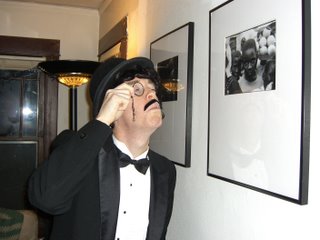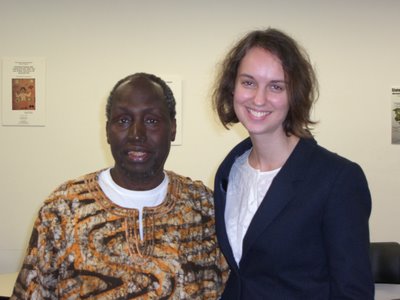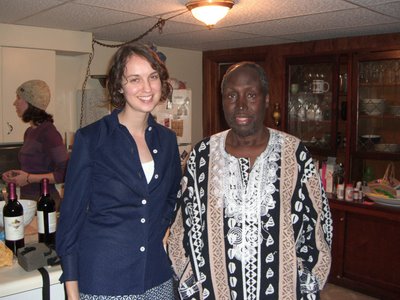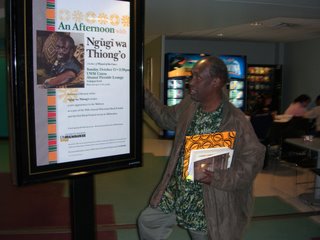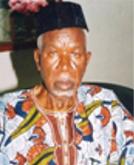I just found out my friend's mother was on the plane. Innalillahi wa inna ilaihirraji'un, Lahaula walak'uwata illa billahil aliyul azim. Wordless, I mouth the words one must say: Allah ya jikanta. Allah ya sa ta huta. Allah ya kai rahama ka kabarinta. Allah ya ba mu hakuri. Amin.
Sultan, Dep Gov, 96 Die in ADC Plane Crash Vanguard (Lagos) NEWS
October 30, 2006
Posted to the web October 30, 2006
By Kenneth Ehigiator, Rotimi Ajayi & Kingsley OmonobiAbuja
IT was yet another black Sunday in Nigeria yesterday after a Boeing 737-2B7 crashed at the Nnamdi Azikiwe Airport, Abuja just moments after take off, killing 98 people on board including the Sultan of Sokoto, Alhaji Muhammadu Maccido, and his Senator son, Alhaji Badamasi Maccido as well as Sokoto Deputy Governor, Alhaji Garba Muhammed.
Indeed, three generations of the Maccidos died in the crash as it also claimed Senator Maccido's son, Umar.
Also killed were outspoken Senator, Alhaji Sule Yari Gandi, his wife and mother, four children of the same parents just named Abdurahman aged 5, 6, 8, and 11 respectively and two high ranking Sokoto title holders-- Alhaji Ahmed Danbaba (Magajin Yari Sokoto) and Alhaji Bello Sule (Magajin Safin Sokoto)-- and the state Education Commissioner.
The Sultan who was buried last night, the Deputy Governor and the Commissioner had gone to Abuja to participate in the Presidential Forum on Education. He was buried last night according to Islamic rites.
There were seven survivors, three of whom were daughters of Governor Ibrahim Idris of Kogi State. Seven farmers who were tending their farms were also killed when the plane crashed on them.
The 23-year-old aircraft took off from Lagos for Sokoto via Abuja, and was on the last lap of the journey when the accident occurred. The aircraft, with registration number 5N-BFK, came down at Tunda Madaki Village, close to the airport, just two kilometres into take off at 11:30 a.m.
Although the cause of the crash was not immediately known, Managing Director of Nigerian Airspace Management Agency (NAMA), Capt. Roland Iyayi, told Vanguard that the pilot ran into a thunderstorm on take off.
Vanguard gathered that because the aircraft had three and a half hours fuel endurance, the impact of the thunderstorm ignited fire which made it burst into flames.
The Director-General of the regulatory agency, the Nigerian Civil Aviation Authority (NCAA), Dr. Harold Demuren, who was on his way to Abuja, cautioned against speculations concerning the cause of the crash.
The Opebi, Ikeja, head office of ADC Airlines looked desolate yesterday, as the staff on duty were yet to recover from the shock caused by the crash.
Spokesperson for the airline, Mrs. Ngozi Wellington, said the crash came as a rude shock, saying the airline was just trying to consolidate. "We had an accident in Abuja this morning. I don't have all the facts yet, but as soon as we have them I shall relay them to you. I must be frank with you, we didn't expect this at all. I'm yet to recover from the shock caused by this crash," she told newsmen.
In a terse statement last night, the company said: "The management of Aviation Development Company Plc regrets to announce the involvement of one of its aircraft in an air accident today, Sunday, October 29, 2006.
"The Sokoto bound Boeing 737 aircraft took off from Abuja at about 11.30 a.m. with 100 passengers and five crew members on board. Attached is the passenger manifest.
"Management commiserates with the families of the bereaved and would release more information."
Search and rescue began in earnest under the supervision of aviation parastatal chiefs, led by the NCAA Director-General.
Family members besiege ADC counter
Meanwhile, families of passengers on board the aircraft besieged ADC Airlines' counter at the Murtala Mohammed Airport, asking for passenger manifest.
The situation at the counter almost got out of control owing to the inability of officials of the airline to convince them that the manifest would be made public as soon as the relevant authorities gave the approval.
Statistics released by the regulatory agency showed that the ill-fated aircraft was airworthy, as it was not due for C-Checks until January 30, 2007.
For the rest of the article and the manifest of passengers at the end of this
article.And, of course, the title of the AOL headline is "
Pilot Ignored Storm Warning." So, is it that the Western media can't just highlight the tragic nature of the event, they must also immediately imply incompetence right from the title?


